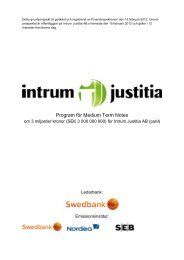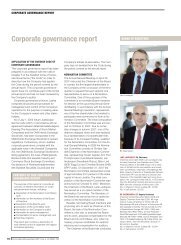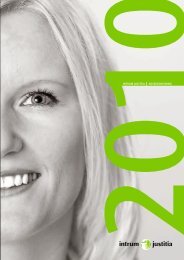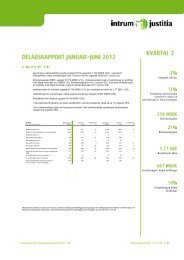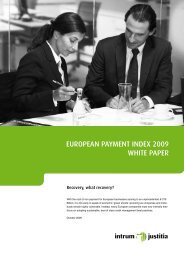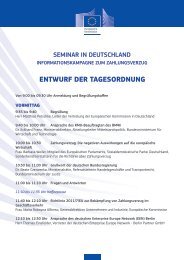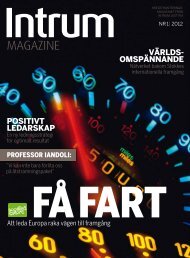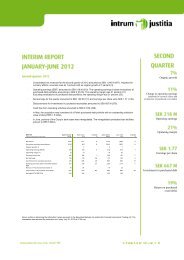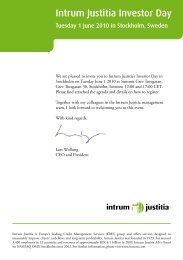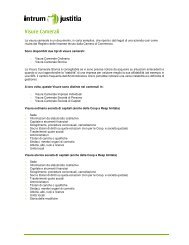ANNUAL REPORT INTRUM JUSTITIA A N N U A L R EP O R T 2 0 ...
ANNUAL REPORT INTRUM JUSTITIA A N N U A L R EP O R T 2 0 ...
ANNUAL REPORT INTRUM JUSTITIA A N N U A L R EP O R T 2 0 ...
Create successful ePaper yourself
Turn your PDF publications into a flip-book with our unique Google optimized e-Paper software.
38<br />
Board of Directors’ report<br />
Conversely, during a recession, the number of<br />
business transactions and invoices falls. Payment<br />
capacity is adversely affected and consequently<br />
a greater percentage of the invoices<br />
result in overdue receivables and collection<br />
cases. The effect is that the number of new cases<br />
decreases, while the number of cases that go to<br />
collections increases and collection becomes<br />
more difficult.<br />
Acquisitions<br />
The ability to successfully implement acquisitions<br />
depends on Intrum Justitia’s capacity<br />
to identify and evaluate acquisition targets<br />
and to effectively integrate them into existing<br />
operations. A potential acquisition may also<br />
depend on the approval of a public authority<br />
or other third party,<br />
Operational risks<br />
Risks of errors and mistakes<br />
Problems in IT systems, mistakes by employees,<br />
deficiencies in internal control and criminal<br />
activity can unfortunately cause problems<br />
that affect Intrum Justitia, the Group’s<br />
clients or their customers. Intrum Justitia has<br />
insurance coverage that protects the Group<br />
as well as the Board of Directors and employees<br />
against such risks, e.g. if claims for damages<br />
are filed due to errors or mistakes.<br />
Operations in different countries<br />
There are risks associated with the international<br />
scope of Intrum Justitia’s business. These mainly<br />
relate to differences in laws and regulations<br />
in the 22 countries where the Group has operations.<br />
Different regulatory and currency issues<br />
must be managed at the same time as Intrum<br />
Justitia must recruit and retain personnel with<br />
the right competence and integrity.<br />
There are significant differences in legislation,<br />
culture, practices and market size in the<br />
various countries. Running a successful CMS<br />
business across Europe requires a local presence<br />
and understanding of local conditions. Responsibility<br />
for managing and developing operations<br />
must rest to a significant extent with the<br />
Group’s regions and national subsidiaries. The<br />
Group’s development is therefore dependent on<br />
the knowledge, experience, integrity and commitment<br />
of local and regional management, as<br />
well as the senior management’s ability to oversee<br />
and control a decentralized organization.<br />
Risks relating to the regulatory environment<br />
Changes in regulations<br />
The CMS industry is regulated by various<br />
national statutes and regulations, which may<br />
also be affected by EU regulations and directives.<br />
Changes in the regulatory environment<br />
may limit Intrum Justitia’s future operations<br />
or involve an increase in costs to comply with<br />
regulations. Because of these risks, Intrum<br />
Justitia is constantly monitoring the EU’s<br />
regulatory work in order to call attention to<br />
the potential for negative effects on European<br />
CMS companies, and lobbies for favourable<br />
changes in regulations.<br />
Financial risks<br />
See also Note 38.<br />
Market risk<br />
This consists of the risks relating to changes in<br />
exchange rates and interest levels.<br />
The results and financial position of foreign<br />
subsidiaries are reported in each country’s<br />
currency and translated to Swedish kronor for<br />
inclusion in the consolidated accounts. Consequently,<br />
fluctuations in exchange rates affect the<br />
Group’s earnings and equity.<br />
In each country, the investments, revenues<br />
and the majority of operating expenses are in<br />
the local currency. Currency fluctuations therefore<br />
have little effect on operating earnings in<br />
the local currency. Revenues and expenses are<br />
matched in a natural manner, which limits<br />
transaction exposure.<br />
The translation exposure that arises when<br />
the balance sheets of foreign subsidiaries are<br />
translated to SEK affects the Group’s shareholders’<br />
equity. The translation exposure has been<br />
hedged since February 2009 through loans in<br />
foreign currencies.<br />
Interest rate risks are primarily related to<br />
the Group’s interest-bearing net debt, which<br />
amounted to SEK 2,193.3 M (2,069.0) at<br />
year-end. Interest rates on loans are tied to the<br />
market rate. Interest fixing terms are short, generally<br />
three months, and consequently, changes<br />
in the market rate quickly impact the Group’s<br />
net financial items.<br />
Financing risk<br />
Financing risk consists of the risk of a loss or<br />
higher than expected expense to guarantee that<br />
the Group can fulfil its payment obligations to<br />
third parties in the short and long term. The<br />
Group’s central treasury department prepares<br />
weekly liquidity forecasts in order to optimize<br />
the balance between loans and liquid assets, so<br />
that the net interest expense can be minimized<br />
without necessarily risking difficulties in fulfilling<br />
outside obligations.<br />
The Group’s long-term financing risk is minimized<br />
by securing committed loan facilities.<br />
Credit risk<br />
This consists of the risk that Intrum Justitia’s<br />
counterparties will be unable to fulfil their<br />
obligations to the Group. Financial assets<br />
that could expose the Group to credit risks<br />
consist of liquid assets, accounts receivable,<br />
purchased debt, outlays on behalf of clients,<br />
derivatives and guarantees.<br />
Risks inherent in purchased debt<br />
As part of its operations, Intrum Justitia acquires<br />
portfolios of consumer receivables and<br />
tries to collect them. Unlike conventional collection<br />
operations where Intrum Justitia works<br />
on behalf of clients in return for commissions<br />
and fees, it assumes all of the rights and risks<br />
associated with the receivables, The portfolios<br />
are usually purchased at prices significantly below<br />
their nominal value, and Intrum Justitia<br />
retains the entire amount it collects, including<br />
interest and fees.<br />
To minimize the risks in this business, Intrum<br />
Justitia exercises caution in its purchase<br />
decisions. The focus is on small and medium-sized<br />
portfolios with relatively low average<br />
amounts, which helps to spread the risk.<br />
Purchases are usually made from clients with<br />
whom the Group has maintained long-term<br />
relationships and therefore has a thorough understanding<br />
of the receivables in question.<br />
Intrum Justitia places high yield requirements<br />
on purchased debt portfolios. Before<br />
every acquisition, a careful assessment is made<br />
based on a projection of future cash flows (collected<br />
amount) from the portfolio. In its calculations,<br />
Intrum Justitia is aided by its long<br />
experience in collection management and its<br />
scoring models. Intrum Justitia therefore believes<br />
that it has the expertise required to evaluate<br />
these types of receivables.<br />
To facilitate the purchase of larger portfolios<br />
at attractive risk levels, Intrum Justitia works in<br />
cooperation with other companies and shares<br />
in the equity investment and profits. Such alliances<br />
have been in place with Crédit Agricole<br />
SA since 2002, with Goldman Sachs since<br />
2003 and with East Capital since 2010.<br />
Guarantees in conjunction with the screening<br />
of charge card applications in Switzerland<br />
As part of its service offering in Switzerland,<br />
Intrum Justitia screens new charge card applications<br />
on behalf of card issuers and guarantees<br />
– for a fee – payment to the issuers of the face<br />
value of the cardholder’s debt in the event of<br />
nonpayment. The total value of the guaranteed<br />
debt amounted to SEK 1,371.2 M (1,270.9),<br />
of which receivables more than 30 days overdue<br />
amounted to SEK 5.5 M (0.8).<br />
Intrum Justitia manages the risk associated<br />
with this business through strict credit limits on<br />
new cards and by analyzing the credit ratings of<br />
card applicants. As of year-end Intrum Justitia<br />
had allocated a provision of SEK 15.4 M (14.0)<br />
in its balance sheet to cover payments that may<br />
arise under the guarantees.




